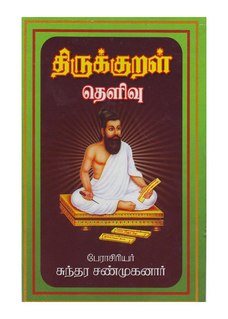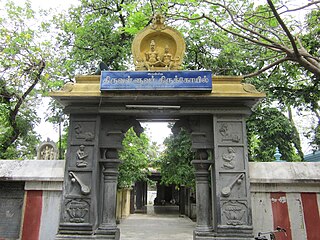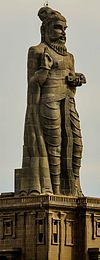
Thiruvalluvar, commonly known as Valluvar, was a celebrated Tamil poet and philosopher. He is best known as the author of the Tirukkuṟaḷ, a collection of couplets on ethics, political and economical matters, and love. The text is considered an exceptional and widely cherished work of the Tamil literature.

Puthandu, also known as Puthuvarudam or Tamil New Year, is the first day of year on the Tamil calendar and traditionally celebrated as a festival. The festival date is set with the solar cycle of the lunisolar Hindu calendar, as the first day of the Tamil month Chithirai. It falls on or about 14 April every year on the Gregorian calendar. The same day is observed elsewhere in South and South East Asia as the traditional new year, but is known by other names such as Vishu in Kerala, and Vaisakhi or Baisakhi in central and northern India.

Valluvar Kottam is a monument in Chennai, dedicated to the classical Tamil poet philosopher Valluvar. It is the city’s biggest Tamil cultural centre.

Maraimalai Adigal was a Tamil orator and writer and father of Pure Tamil movement. He was a fervent Saivite Hindu. He wrote more than 100 books, including works on original poems and dramas, but most famous are his books on his research into Tamil literature. Most of his literary works were on Saivism. He founded a Saivite institution called Podhunilaik Kazhagam. He was an exponent of the Pure Tamil movement and hence considered to be the father of Tamil linguistic purism. He advocated the use of Tamil devoid of Sanskrit words and hence changed his birth name Vedhachalam to Maraimalai.

The Thiruvalluvar Statue, or the Valluvar Statue, is a 41-metre-tall (133 ft) stone sculpture of the Tamil poet and philosopher Valluvar, author of the Tirukkural, an ancient Tamil work on Dharma and morality. It is located atop a small island near the town of Kanyakumari on the southernmost point of the Indian peninsula on the Coromandel Coast, where two seas and an ocean meet. The statue was sculpted by the Indian sculptor V. Ganapati Sthapati, who also created the Iraivan Temple, and was unveiled on the millennium day of 1 January 2000 by the then Chief Minister M. Karunanidhi. It is currently the 25th tallest statue in India.

Thani Tamil Iyakkam is a linguistic-purity movement in Tamil literature which attempts to avoid loanwords from Sanskrit, English and other languages. The movement began in the writings of Maraimalai Adigal, Paventhar Bharathidasan, Devaneya Pavanar, and Pavalareru Perunchitthiranaar, and was propagated in the Thenmozhi literary magazine founded by Pavalareru Perunchithiranar. V. G. Suryanarayana Sastri, a professor, was a 19th-century figure in the movement; in 1902 he demanded classical-language status for Tamil, which it received in 2004.

Kalyanasundaram Anbazhagan was an Indian politician. He was a long-standing leader of the Dravidian movement and was the General Secretary of Dravida Munnetra Kazhagam party for nine terms. He has held several cabinet ministerial portfolios in the Tamil Nadu government under M. Karunanidhi including Finance, Education and Health and Social Welfare. He was elected as a member of the Tamil Nadu Legislative Assembly on nine occasions. He was earlier elected to the Lok Sabha the lower house of India's Parliament from Tiruchengode and was also a member of the Madras Legislative Council. He was popularly referred to as Perasiriyar (Professor), though he was a Lecturer in Tamil in Pachaiyappa's College before resigning to contest elections in 1957.
Parimelalhagar, sometimes spelled Parimelazhagar, born Vanduvarai Perumal, was a Tamil poet and scholar known for his commentary on the Thirukkural. He was the last among the canon of ten medieval commentators of the Kural text most highly esteemed by scholars. He was also among the five oldest commentators whose commentaries had been preserved and made available to the Modern era, the others being Manakkudavar, Pari Perumal, Kaalingar, and Paridhi. Of all the ancient commentaries available of the Kural literature, Parimelalhagar's commentary is considered by scholars as the best both in textual and in literary aspects. The codification of the writings of Valluvar is attributed to Parimelalhagar. Parimelalhagar also remains the most reviewed, in terms of both praise and criticism, of all the medieval Kural commentators. Praised for its literary richness and clarity, Parimelalhagar's commentary is considered highly complex and exquisite in its own right that it has several scholarly commentaries appearing over the centuries to elucidate it. Along with the Kural text, Parimelalhagar's commentary has been widely published that it is in itself regarded a Tamil classic.

The Tirukkuṟaḷ, or shortly theKural, is a classic Tamil language text consisting of 1,330 short couplets, or kurals, of seven words each. The text is divided into three books with aphoristic teachings on virtue (aram), wealth (porul) and love (inbam), respectively. Considered one of the greatest works ever written on ethics and morality, it is known for its universality and secular nature. Its authorship is traditionally attributed to Valluvar, also known in full as Thiruvalluvar. The text has been dated variously from 300 BCE to 5th century CE. The traditional accounts describe it as the last work of the third Sangam, but linguistic analysis suggests a later date of 450 to 500 CE and that it was composed after the Sangam period.

R. P. Sethu Pillai (1896–1961), was a Tamil scholar, writer and professor of Tamil at the University of Madras.

Thiruvalluvar Temple, also known as the Ekambareswarar–Kamakshi Temple, is a Hindu temple dedicated to the poet-saint Valluvar in the neighborhood of Mylapore in Chennai, India. The shrine is located within the Ekambareswarar temple complex. Believed to have been constructed in the early 16th century, the temple was extensively renovated in the 1970s. Traditionally believed to be the birthplace of Saint Valluvar, the temple is the oldest ever built to Valluvar. The temple also serves as the venue for meetings of Tamil language enthusiasts. While many consider the temple as the birthplace of Valluvar, some consider it as his samadhi.
Yu Hsi is a Taiwanese Tamil poet and scholar, who has translated the Tirukkural and the poems of Subramaniya Bharathi and poet Bharathidasan in Mandarin. He is the founder president of the Tamil Sangam in Taiwan. He has received various awards, including awards from Seoul World Academy of Arts and Culture (2004), Thiruvalluvar Award (2014), and a felicitation from former President of India A. P. J. Abdul Kalam.
K. M. Balasubramaniam was a Tamil writer and supporter of the Dravidian Movement, and a translator of the Tirukkural into English. He came to be known as Thiruvachakamani for his translation of Manikkavacakar’s Thiruvasagam into English before translating the Kural text.
K. Vadivelu Chettiar (1863–1936) was a Tamil scholar of the early twentieth century. He is best known for his exegesis on the Parimelalhagar's commentary to the Tirukkural.
The dating of the Tirukkural, and by extension the period of its author Valluvar, has been a subject of intense debate among scholars for centuries, and it continues to remain so. The Kural is variously dated between 300 BCE and 5th century CE. According to Blackburn, the "current scholarly consensus" dates the text and the author to approximately 500 CE. The Tamil Nadu government has ratified 31 BCE as the year of birth of Valluvar. Still the precise date as to when Valluvar completed writing the Kural text remains murky. This article speaks about various dates arrived at by various scholars over time.

Vasuki was a Tamil woman who lived around the late or post Sangam era. She was the wife of the Tamil poet-philosopher Valluvar. She is traditionally considered a faithful wife and a model of Tamil womanhood.
Elelasingan, also known as Elelasingan Chettiyar, Elela and Alara, was a Tamil merchant who lived in Mylapore, by the shores of the Pallava Kingdom, trading between India and Ceylon. He is best known as the contemporary, friend, and disciple of the celebrated Tamil poet and philosopher Valluvar.
Kaanum Pongal or Kanum Pongal is the fourth and the final day of the four-day Pongal festival. According to the Gregorian calendar it is celebrated on 17 January. Though the name of the festival is specific to Tamil Nadu, it is also celebrated in other southern Indian states such as Andhra Pradesh and Karnataka as the festival is significantly popular in South India. The day of Kaanum Pongal is often acknowledged as the Thiruvalluvar Day in remembrance of the great historic Tamil writer, poet and philosopher Thiruvalluvar who was known for writing the world famous Thirukural. The day is also popularly treated as the sightseeing day as well as the Thanksgiving day. People believe Kaanum Pongal is an auspicious day to arrange marriage proposals and to kick start new bonds and relationships.
Umapathi Shivachariyar was a Tamil poet and scholar. It is from his writings that details about earlier poets, chiefly Parimelalhagar, have become known.
Thiruvalluvar Award is an annual award given by the State Government of Tamil Nadu, India, in memory of the ancient poet-philosopher Valluvar. It is given to those who have made an outstanding contribution towards the Kural literature and its philosophy. It is given in January of every year since 1986, on the 2nd day of the Tamil month of Thai observed by the Tamil Nadu government as the Thiruvalluvar Day, and is given on behalf of Tamil Development Authority.













